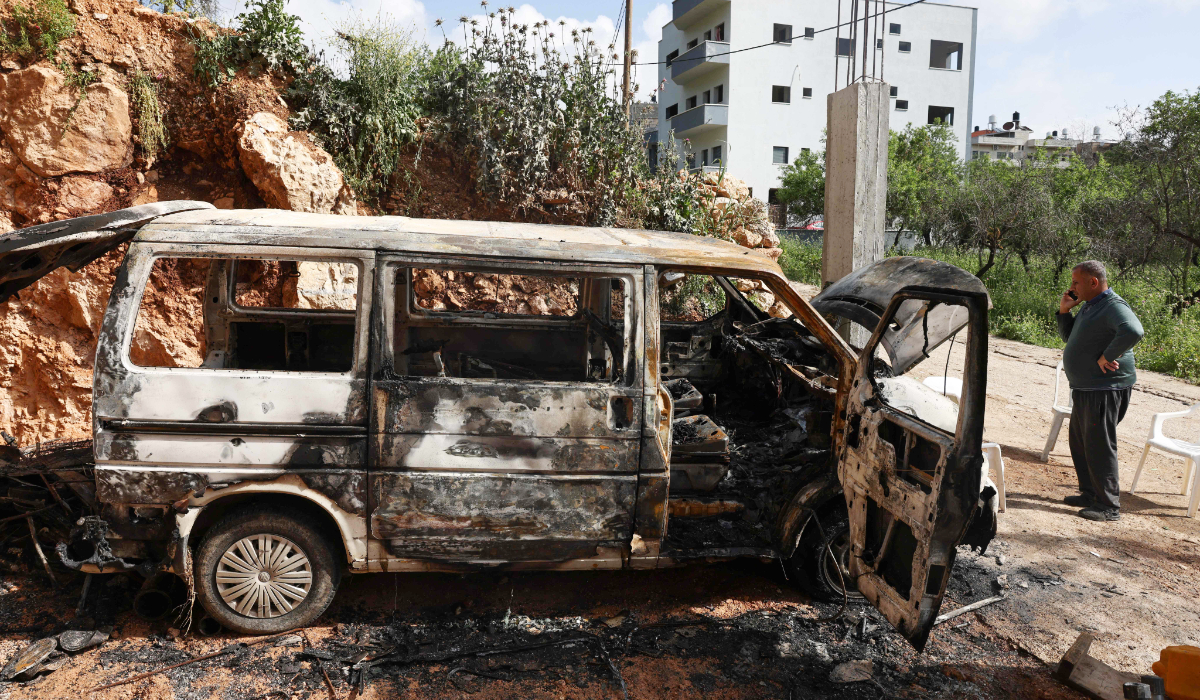JERUSALEM: Dozens of angry Israeli settlers stormed into a Palestinian village in the Israeli-occupied West Bank on Friday, shooting and setting houses and cars on fire. The rampage killed a Palestinian man and wounded 25 others, Palestinian health officials said.
The violence was the latest in an escalation in the West Bank that has accompanied the war in the Gaza Strip. An Israeli rights group said the settlers were searching for a missing 14-year-old boy from their settlement. After the rampage, Israeli troops said they were still searching for the teen.
The killing came after an Israeli raid overnight killed two Palestinians, including a Hamas militant, in confrontation with Israeli forces.

A Palestinian man checks a burnt vehicle after a reported attack by Israeli settlers in the village of Al-Lubban ash-Sharqiya, south of nablus in the occupied West Bank, on April 11, 2024. (AFP)
Palestinian health officials say over 460 Palestinians have been killed in the West Bank by Israeli forces since the war erupted in October.
The Israeli human rights group Yesh Din said that settlers stormed into the village of Al-Mughayyir late Friday, searching for the Israeli boy. The group said that settlers were shooting and setting houses on fire in the village.
Videos posted to X by the rights group showed dark clouds of smoke billowing from burning cars as gunshots rang out. A photo posted by the group showed what appeared to be a crowd of masked settlers.
The Palestinian Health Ministry said that one man was brought dead to a hospital and 25 were treated for wounds. The Palestine Red Crescent Society said eight of the injured were hit by live fire from settlers.
The deceased man was later identified by his family as 26-year-old Jehad Abu Alia. His father, Afif Abu Alia, said he was shot dead but was unsure whether the fatal bullet was fire by an armed settler or an Israeli soldier.
“My son went with others to defend our land and honor, and this is what happened,” Afif Abu Alia said from a hospital in the West Bank city of Ramallah, where his son’s corpse had been transported.
The attack was condemned by Mohamed Mustafa, the new Palestinian prime minister.
The Israeli army said it was searching for the 14-year-old boy, and that forces had opened fire when stones were hurled at soldiers by Palestinians. It said soldiers also cleared out Israeli settlers from the village.
“As of this moment, the violent riots have been dispersed and there are no Israeli civilians present within the town,” it said.
US officials, including President Joe Biden, have repeatedly raised concerns about a surge in settler violence against Palestinians in the West Bank since Israel’s war with the militant Hamas group in the Gaza Strip began. Rights groups have long accused the military of failing to halt settler violence or punish soldiers for wrongdoing.
Earlier on Friday, two Palestinians were killed in confrontations with Israeli forces in the northern West Bank, Palestinian medics and the military said. Hamas said one of those killed was a local commander.
The military said the target of the soldiers’ raid was Mohammed Daraghmeh, a local Hamas commander. It said Daraghmeh was killed in a shootout with Israeli soldiers who discovered weapons in his car. The army alleged that Daraghmeh had been planning attacks on Israeli targets but provided no evidence. It also said assailants hurled explosives at soldiers.
The Israel-Hamas war started on Oct. 7, when Hamas killed 1,200 Israelis, mostly civilians, in a surprise attack and incursion into southern Israel. Around 250 people were seized as hostages by the militants and taken to Gaza.
Israel said Friday it had opened a new crossing for aid trucks into hard-hit northern Gaza as ramps up aid deliveries to the besieged enclave. However, the United Nations says the surge of aid is not being felt in Gaza because of persistent distribution difficulties.
Six months of fighting in Gaza have pushed the tiny Palestinian territory into a humanitarian crisis, leaving more than 1 million people on the brink of starvation.
Israeli bombardments and ground offensives in Gaza have killed more than 33,600 Palestinians and wounded over 76,200, the Health Ministry says. The ministry doesn’t differentiate between civilians and combatants in its tally, but says women and children make up two-thirds of the dead.
Israel says it has killed over 12,000 militants during the war, but it has not provided evidence to back up the claim.





























